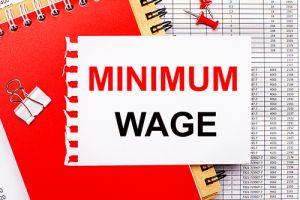
Dwight A. Weingarten
A $15 an hour minimum wage appears to be getting pushed up after a pandemic and a political party change in the Government House, leaving those who advocated for the change initially elated while some in the business community feel like a brokered compromise has been broken.
“We were very excited that the governor made this one of his priority pieces of legislation,” said Ricarra Jones, political director for 1199SEIU, a labor organization in the region representing more than 10,000 members in the health care field and one of the co-founders of the original Fight for $15 campaign.
A portion of the business community met the proposal by new Gov. Wes Moore, a Democrat, less enthusiastically.
“The deal that was made in 2019 was obviously off the table,” said Bill Chambers, president and CEO of the Salisbury Area Chamber of Commerce, referring to Moore’s legislation and the state law passed before the pandemic that would phase in the $15 minimum wage over time.
Under that agreement, large employers with more than 14 employees had until January 1, 2025, to meet a $15 minimum wage. Those with 14 or fewer employees had until July 1, 2026.
Now, all businesses, with some limited sector exceptions, will have to pay the $15 an hour wage by Jan. 1, 2024. On his Twitter account, Moore said that the “Fair Wage Act raises the minimum wage to $15 so we can move 152,000 children up the economic rung.”
The wage was already set to be raised to $15 an hour under the 2019 legislation. The change, however, “created a lot of mistrust” with the business community, Chambers said.
Middle path on minimum wage leaves some on both sides dissatisfied
The path ultimately pursued by the Legislature leans towards the middle, leaving neither side — business or Fight for $15 advocates — totally satisfied, but reflects political compromise on an issue that has garnered attention around the globe. Leaders from both Greece and Jamaica announced increases to the minimum wage in their respective countries earlier this month.
plus the District of Columbia, Guam and the Virgin Islands with minimum wage rates set higher than the federal minimum wage of $7.25 an hour, the national rate since 2009. A minority of states, and the District of Columbia, tie minimum wage increases to inflation, a move Maryland’s governor personally supported, but which was ultimately pulled from a version of the bill.
Jones, of 1199SEIU, said she was “disappointed indexing is no longer in the Senate (bill),” alluding to the initial legislation that would have indexed future minimum wages to inflation (up to 5.0%) each year beginning July 1, 2025.
Amy Thompson, executive director of the Greater Ocean City Chamber of Commerce, whose organization supported the House bill with amendments, including nixing the inflation aspect, called the tie to the consumer price index “problematic for two reasons.”
“One,” she said, “it’s kind of a set it, forget it mentality.”
Salisbury’s Chambers said the Legislature should be required to vote to alter the minimum wage. Thompson said the second problem is: As labor costs go up, then prices go up.
“There’s this revolving cycle,” she said.
Chambers got to the meat of the matter in a different way.
“A business owner in Salisbury told me a few months ago, if the state wants to raise the minimum wage to $50 an hour, let them raise it to $50 an hour,” he recounted, “I’m just going to be charging $45 for a hamburger.”
Competing across state lines
Paul Frey, president and CEO of the Washington County Chamber of Commerce, who spent a couple decades operating Roy Rogers Restaurants, said the Western Maryland county competes for labor with neighboring states.
“We’re regional area,” said Frey, referencing the minimum wage of $7.25 an hour in Pennsylvania and $8.75 an hour in West Virginia, “We compete across those lines.”
Also neighboring parts of Maryland are D.C., which has the highest minimum wage in the nation at $16.10 an hour, Virginia at $12.00 an hour and Delaware at $11.75 an hour.
The debate in Annapolis this year was no longer about whether a $15 an hour minimum wage would be the law, but rather when it would take effect and how it would proceed.
“The business community, in general, fought that (2019) legislation overall, and the compromise was to put it in over a number of years,” Frey said. “When this gets changed, in the middle of that compromise, that commitment, it impacts some of these businesses that have made plans.”
Sen. Mary Beth Carozza, R-Wicomico/Worcester/Somerset, who voted against bill to the increase the minimum wage, painted the proposed move by Democrats in a similar way.
“There’s a fundamental issue of fairness,” said Carozza, whose parents owned the first fast food drive-through restaurant in Ocean City. “You are changing the rules in the middle of the game.”
With about eight months to make the change, Thompson in Ocean City said the switch may be a pain, but she emphasized the resiliency of many businesses in the beach town.
“Ocean City business owners are pretty nimble, and they were already adjusting to the market,” said Thompson, “I don’t think $15 an hour, for many of our members, will be a deal breaker.”
Dwight A. Weingarten is an investigative reporter, covering the Maryland State House and state issues. He can be reached at dweingarten@gannett.com or on Twitter at @DwightWeingart2.




